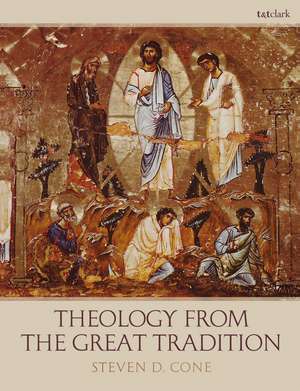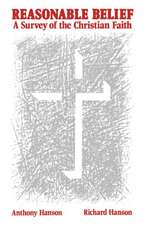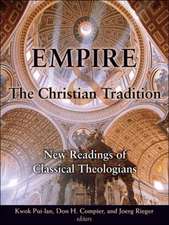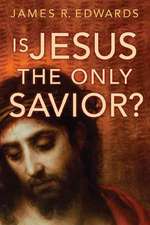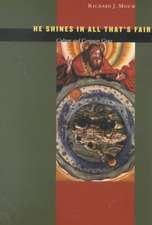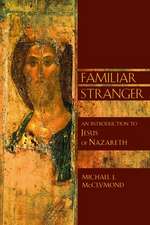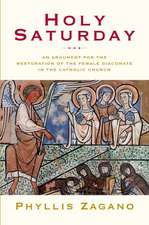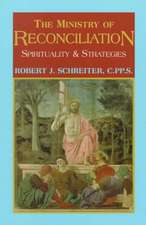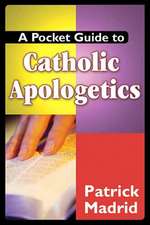Theology from the Great Tradition
Autor Dr Steven D. Coneen Limba Engleză Paperback – 21 feb 2018
| Toate formatele și edițiile | Preț | Express |
|---|---|---|
| Paperback (1) | 279.10 lei 6-8 săpt. | +105.62 lei 6-12 zile |
| Bloomsbury Publishing – 21 feb 2018 | 279.10 lei 6-8 săpt. | +105.62 lei 6-12 zile |
| Hardback (1) | 853.87 lei 6-8 săpt. | |
| Bloomsbury Publishing – 21 feb 2018 | 853.87 lei 6-8 săpt. |
Preț: 279.10 lei
Preț vechi: 324.54 lei
-14% Nou
Puncte Express: 419
Preț estimativ în valută:
53.41€ • 57.11$ • 44.53£
53.41€ • 57.11$ • 44.53£
Carte tipărită la comandă
Livrare economică 17 aprilie-01 mai
Livrare express 12-18 martie pentru 115.61 lei
Preluare comenzi: 021 569.72.76
Specificații
ISBN-13: 9780567669995
ISBN-10: 0567669998
Pagini: 752
Dimensiuni: 189 x 246 x 58 mm
Greutate: 1.43 kg
Editura: Bloomsbury Publishing
Colecția T&T Clark
Locul publicării:London, United Kingdom
ISBN-10: 0567669998
Pagini: 752
Dimensiuni: 189 x 246 x 58 mm
Greutate: 1.43 kg
Editura: Bloomsbury Publishing
Colecția T&T Clark
Locul publicării:London, United Kingdom
Caracteristici
An ecumenical systematic theology textbook grounded in Scripture and the tradition of the Church
Notă biografică
Steven D. Cone is Associate Professor of Theology at Lincoln Christian University, USA.
Cuprins
1. Introduction A. Theology and the Great Tradition B. How to Use this BookMODULE 1: THEOLOGICAL FOUNDATIONS2. Theological Method3. Theological Authorities4. Scripture5. Historical Section I: Inspiration and Interpretation of Scripture A. Augustine B. Jerome C. A. A. Hodge D. James Orr E. Donald Bloesch F. Summary G. Discussion questions H. Chapter bibliographyMODULE 2: THEOLOGICAL AUTHORITIES6. Reason7. Tradition8. Experience9. Historical Section II: Faith and Reason A. Clement of Alexandria B. Tertullian C. Augustine D. The Belgic Confession E. Benedict XVI F. Summary G. Discussion questions H. Chapter bibliographyMODULE 3: DOCTRINE OF GOD10. God11. Historical Section III: Proofs of God's Existence A. Anselm of Canterbury B. Thomas Aquinas C. Blaise Pascal D. Summary E. Discussion questions F. Chapter bibliographyMODULE 4: THE TRINITY12. The Trinity13. Historical Section IV: The Trinity A. Irenaeus B. Gregory of Nyssa C. Augustine D. The 11th Council of Toledo E. Leonardo Boff F. Summary G. Discussion questions H. Chapter bibliographyMODULE 5: THE WORK OF GOD14. Creation15. Providence16. Historical Section V: God and Creation A. Irenaeus B. Tertullian C. Origin D. Augustine E. Bonaventure F. Anselm G. Summary H. Discussion questions I. Chapter bibliographyMODULE 6: HUMAN BEINGS17. The Image of God18. The Human Good19. Historical Section VI: Human Nature and Destiny A. Gregory of Nyssa B. John Scotus Eriugena C. Hildegard of Bingen D. Mechthild of Magdeburg E. Emil Brunner F. Mary Hayter G. Summary H. Discussion questions I. Chapter bibliographyMODULE 7: SIN20. The Origin of Sin21. The Nature of Sin22. Historical Section VII: Sin and Freedom A. Irenaeus B. Augustine C. Pelagius D. John Cassian E. Julian of Norwich F. Giovani Pico della Mirandola G. Reinhold Niebuhr H. Summary I. Discussion questions J. Chapter bibliographyMODULE 8: THE PERSON OF CHRIST23. The Person of the Christ24. The Incarnation25. Historical Section VIII: The Incarnation A. Tertullian B. Athanasius C. Cyril of Alexandria D. Leo I E. T. F. Torrance F. Summary G. Discussion questions H. Chapter bibliographyMODULE 9: THE WORK OF CHRIST26. The Work of Christ27. Historical Section IX: The Work of Christ A. Irenaeus B. Athanasius C. Maximus the Confessor D. Anselm E. Peter Abelard F. Vladimir Lossky G. Summary H. Discussion questions I. Chapter bibliographyMODULE 10: THE HOLY SPIRIT28. The Person of the Holy Spirit29. The Work of the Holy Spirit30. Historical Section X: The Holy Spirit A. Basil B. Augustine C. Cyril of Alexandria D. Michael Green E. John Paul II F. Summary G. Discussion questions H. Chapter bibliography MODULE 11: SALVATION31. Grace and Freedom32. Divinization33. Historical Section XI: Justification and Sanctification A. Martin Luther B. Philipp Melanchthon C. John Calvin D. John Wesley E. Richard Watson F. Vatican II G. Summary H. Discussion questions I. Chapter bibliographyMODULE 12: THE CHURCH34. The Church35. Ministry in the Church36. The Heavenly Host37. Historical Section XII: The Church A. Ireneaus B. Martin Luther C. Vatican II D. John Zizioulas E. Stanley Hauerwas F. Summary G. Discussion questions H. Chapter bibliographyMODULE 13: SACRAMENTS38. Sacraments39. The Sacrament of Water40. The Sacrament of Bread and Wine41. Historical Section XIII: The Sacraments A. Cyril of Jerusalem B. Martin Luther C. The World Council of Churches D. Alexander Schmemann E. Rowan Williams F. John Paul IIMODULE 14: ETERNAL LIFE42. Heaven43. Death 44. Millennium and Tribulation45. Historical Section XIV: Last Things A. Theophilus of Antioch B. Augustine C. Catherine of Sienna D. Jeremy Taylor E. C. S. Lewis F. Kathryn Tanner G. Summary H. Discussion questions I. Chapter bibliographyMODULE 15: CHRISTIANITY AND THE WORLD RELIGIONS46. Christianity and the World Religions47. Historical Section XV: Christianity and the World Religions A. Basil B. C. S. Lewis C. Vatican II D. John Hick E. Clark Pinnock F. Leslie Newbingen G. Summary H. Discussion questions I. Chapter bibliography48. End matter A. Recommended bibliography B. Indices i. Subject ii. Name iii. Scripture C. Endnotes
Recenzii
This is the sort of theology book Thomas Aquinas envisioned: it brings all that belongs to the Christian faith into a full account that flows 'according to the subject matter.' The great tradition comes alive here, in a depth that inspires rather than wearies or confuses. His use of a dialectic of history and 'message' is a model for theologians today. A true teacher's book, and a book that invites students of theology into a rich, ancient, and always regenerating conversation about and with the God of scripture.
My long search for the 'perfect' textbook of Christian theology may have come to an end. Cone's book is pedagogically brilliant, comprehensive, balanced, informed, clearly argued, and well-illustrated. Guided by the Great Tradition, it is ecumenical and committed, critical and faithful, traditional and current. Cone's work is an astounding achievement to be welcomed by every teacher and student of Christian theology.
In Theology from the Great Tradition, Steve Cone provides readers with a full introduction to the theological discourse that stretches from the first century to the twenty-first century. Building upon his earlier work, Cone here offers a robust study that will be beneficial to students and scholars alike.
Few are the books that aid students in building an approach to Christian theology from the ground up, but Cone's volume here does just that with skill and with a wide compass. He considers afresh the authorization of the theological quest through scripture, tradition, reason, and experience, while also addressing what we are actually 'doing' when we 'do' theology. Cone also wonderfully solicits the guidance of historic Christian thinkers, and the wisdom of a diverse range of contemporary theologians, to explore the enduring themes of Christian thought and life. This book bursts the bounds of a primer, but in its breadth and depth is sure to be an excellent textbook for college and seminary courses.
My long search for the 'perfect' textbook of Christian theology may have come to an end. Cone's book is pedagogically brilliant, comprehensive, balanced, informed, clearly argued, and well-illustrated. Guided by the Great Tradition, it is ecumenical and committed, critical and faithful, traditional and current. Cone's work is an astounding achievement to be welcomed by every teacher and student of Christian theology.
In Theology from the Great Tradition, Steve Cone provides readers with a full introduction to the theological discourse that stretches from the first century to the twenty-first century. Building upon his earlier work, Cone here offers a robust study that will be beneficial to students and scholars alike.
Few are the books that aid students in building an approach to Christian theology from the ground up, but Cone's volume here does just that with skill and with a wide compass. He considers afresh the authorization of the theological quest through scripture, tradition, reason, and experience, while also addressing what we are actually 'doing' when we 'do' theology. Cone also wonderfully solicits the guidance of historic Christian thinkers, and the wisdom of a diverse range of contemporary theologians, to explore the enduring themes of Christian thought and life. This book bursts the bounds of a primer, but in its breadth and depth is sure to be an excellent textbook for college and seminary courses.
